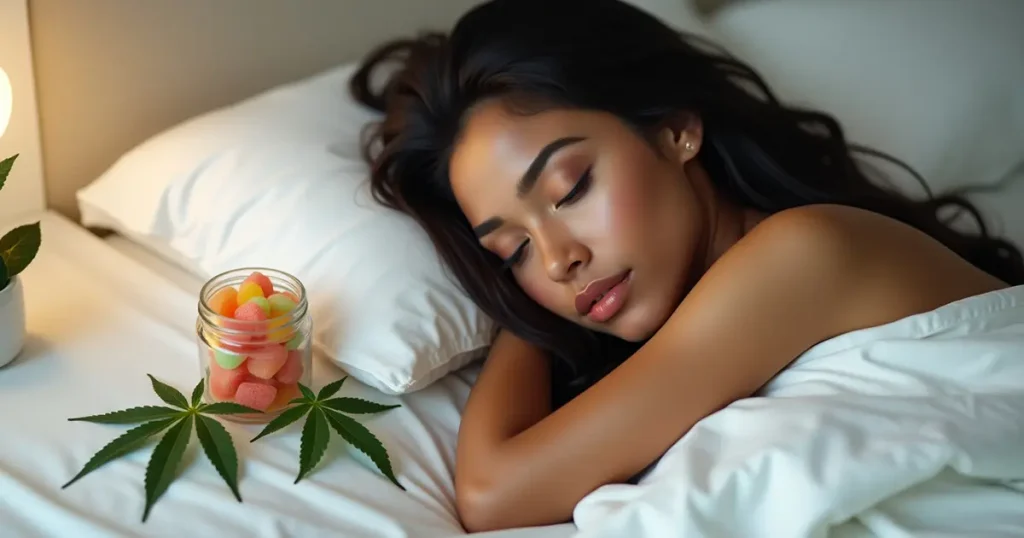CREDIT CARD GATEWAY: Our credit card processor is back up and running!
Check Here for Weekly Promotions! – How can we improve? Any suggestions please email reefsideorder@gmail.com Dismiss

The Pros and Cons of THC Edibles for Sleep
What Are THC Edibles?
THC edibles are food products infused with tetrahydrocannabinol (THC), the main psychoactive compound in cannabis. Edibles can come in many forms, such as gummies, cannabis chocolates, or weed baked goods. When you eat an edible, the THC is processed by your liver. This changes how quickly and intensely you feel its effects.
Edibles for sleep often include products labelled as “indica edibles,” referring to cannabis strains believed to have more calming effects. You might also see “THC gummies for sleep” or “best weed gummies” on packaging. These keywords help users find products aimed at promoting relaxation and rest.
How Do Edibles Affect Sleep?
THC interacts with your body’s endocannabinoid system. This system helps regulate sleep, mood, and pain. When THC binds to receptors in your brain, it may boost sleep-promoting chemicals like adenosine. It can also calm your brain’s arousal circuits, making it easier to drift off.
Most evidence comes from short-term studies. These studies suggest that occasional use of cannabis products, including edibles, can help you fall asleep faster. But researchers still debate whether regular use improves or harms overall sleep quality.

Pros of Using THC Edibles for Sleep
1. May Help You Fall Asleep Faster
Many people use edibles for sleep because they report falling asleep more quickly. In one survey, about 70% of young adults who used cannabis said they did so to help with sleep. Edibles often produce longer and more consistent effects than smoking, which can aid in relaxation before bed.
2. Long-Lasting Effects
Edibles take longer to kick in—typically 30 minutes to two hours—but effects can last six to eight hours. This means you may stay asleep longer without waking up too soon. That makes THC gummies for sleep a popular choice for those with middle-of-the-night awakenings.
3. Precise Dosing
Packaged edibles come with clear labels showing THC content. This lets you control your dose. As a result, you can experiment to find the best weed gummies dose that helps you without making you too groggy the next day.
4. Discreet and Smoke-Free
If you dislike smoking or vaping, edibles offer a discreet alternative. They don’t produce smoke or odor. You can enjoy them quietly at home or before bedtime.
Cons of Using THC Edibles for Sleep
1. Variable Onset and Intensity
Because edibles must be digested, their effects can be delayed and unpredictable. If you take a dose and it seems to do nothing, you might take more—only to find it strong hours later. This can lead to feeling too high or anxious.
2. Possible Sleep Fragmentation
While THC can help you fall asleep, it may also disrupt sleep later in the night. Experts note that the first half of the night may be more restful, but awakenings can increase in the second half. This fragmentation might leave you feeling less refreshed.
3. Tolerance and Dependence
With regular use, your body can build tolerance. You may need higher doses to achieve the same sleep effects. In some cases, this can lead to psychological dependence, where you feel you cannot sleep without edibles.
4. Next-Day Grogginess
High doses of THC can linger, causing drowsiness the next morning. This “hangover” effect can impair your focus and mood. It is especially important to avoid driving or heavy machinery until THC has fully cleared your system.

Things to Consider Before Trying Edibles for Sleep
- Start Low, Go Slow: Begin with a small dose (5 mg THC or less) and wait at least two hours before taking more.
- Choose Indica Edibles: Indica strains are often associated with calming effects. They may be better suited for sleep than sativa strains.
- Time Your Dose: Take your edible about 1–2 hours before bedtime to align its peak effects with when you want to fall asleep.
- Avoid Mixing Substances: Combining edibles with alcohol or other sedatives can increase risks like dizziness and impaired coordination.
- Consult a Professional: If you have a sleep disorder or health conditions, talk to your healthcare provider before using any cannabis product.
How to Find the Best Weed Gummies
When searching for best weed gummies, look for products that:
- Clearly list THC content per serving.
- Use quality ingredients and third-party lab testing.
- Offer a balance of THC and CBD for milder effects.
- Provide clear usage instructions and warnings.
Visiting Reefside’s selection of indica edibles can help you find reliable options tested for potency and purity. By choosing a trusted weed edibles source, you ensure that you get consistent and safe doses.
Are Edibles Right for You?
Using edibles for sleep can offer real benefits, especially if you struggle with falling asleep. However, they are not a one-size-fits-all solution. Your personal response may vary. Some people find relief, while others experience restless or fragmented sleep.
Keep a sleep diary to track how edibles affect your sleep onset, duration, and quality. Note any next-day effects on mood and alertness. This data can guide your choices and help you find the right dose.
Conclusion
THC edibles, including THC gummies for sleep, offer a smoke-free, discreet way to support sleep. They may help you fall asleep faster and stay asleep longer. But they also carry risks such as sleep fragmentation, tolerance, and next-day grogginess.
By starting with low doses, timing your dose properly, and choosing quality products, you can minimize downsides. If you’re curious, explore Reefside’s curated range of indica edibles and best weed gummies. Always listen to your body and adjust your approach as needed. With careful use, edibles can be a helpful tool in your sleep toolkit.
REFERENCES:
Danielle P. Medically Reviewed by Dr. Anis R. (2024, April 2). Cannabis for Sleep: Risks and Benefits. Available at: https://www.sleepfoundation.org/sleep-aids/cannabis-and-sleep
Michigan Medicine – University of Michigan. (2024, April 3). Does marijuana actually help with sleep problems?. Available at: https://www.medicine.umich.edu/dept/psychiatry/news/archive/202404/does-marijuana-actually-help-sleep-problems
Dr. Leslie Lars Iversen, CBE FRS MAE
Categories
- Accessories (13)
- Best Sellers (51)
- Brands (189)
- Alivia (6)
- Faded (2)
- Syringe Oil (1)
- Vape (1)
- Firecracker (12)
- FRESH (13)
- Pre-Rolls (12)
- GAIA Wellness (31)
- Grandpa's (1)
- Green Supreme (6)
- Happy High (4)
- High Dose (8)
- ILU (1)
- Island Therapeutics (6)
- Jelly Bites (6)
- Mastermind (9)
- Capsules (5)
- Chocolate Bar (4)
- P.S. I'm Baked (5)
- Peazys (1)
- Proper Extracts (9)
- Reefer Kings (2)
- Reefside (4)
- Social Cannabis (1)
- SS7 (7)
- Pre-Rolls (7)
- Twisted Extracts (61)
- Buy in Bulk (19)
- Capsules (14)
- Concentrates (10)
- Edibles (77)
- Bundles (2)
- Caramels & Toffee (13)
- Chocolates (4)
- Gummy Candy (61)
- Jelly Bombs (18)
- Organic (1)
- Salted Caramelts (6)
- Sour Twisted Singles (17)
- Gift Card (1)
- Highly Potent (37)
- New Arrivals (80)
- Pre-Rolls (34)
- Sativa Selects (29)
- Shop by Strain Type (120)
- CBD (37)
- Hybrid (2)
- Indica (32)
- Indica 1:1 (7)
- Sativa (38)
- Sativa 1:1 (10)
- Sleep Easy (22)
- Staff Picks (33)
- Tinctures & Oil Drops (27)
- Topicals (14)
- Bath, Beauty and Skin (7)
- Pain Relief (9)
- Uncategorized (11)
- Vapes (9)
- Vape Tops (8)
